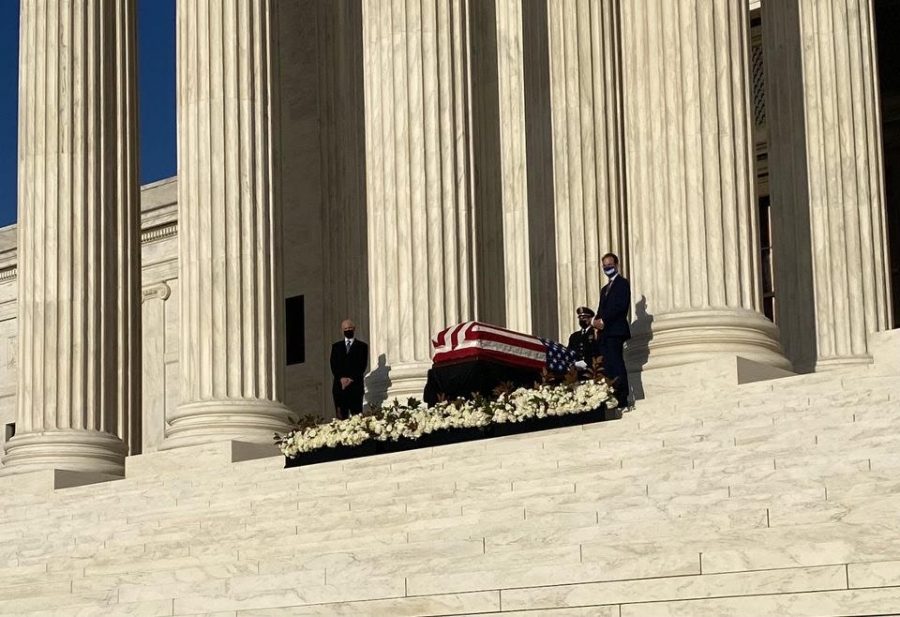Ginsburg’s lasting effects on rights in America
Ruth Bader Ginsburg lies in state at the U.S. Capitol building as civilians pay their respects.
November 3, 2020
A woman who has bought a house and has a credit card in her name can thank Justice Ruth Bader Ginsburg who passed away on Sept. 18 at 87 years old. She was the second woman to serve on the Supreme Court and did so for 27 years. She advocated for the LGBTQ community, women’s reproductive rights and gender equality in the courtroom.
“One of the most influential things that she did was being against Roe v. Wade. That’s huge because she was known as a feminist,” junior Mahima Suresh said.
Ginsburg was very critical of Roe v. Wade. In the same term, Roe v. Wade was decided, she was an ACLU attorney representing Capt. Susan Struck. In that case, Captain Struck was an Air Force nurse in Vietnam who got pregnant. Abortion was prohibited in most states but it was allowed in the military. She had the choice to have the baby or leave the Air Force. The Air Force saw they weren’t likely to win so they changed their policy. Captain Struck had her baby and got to keep her job but the court never heard this case.
Ginsburg wanted this case to provide a stronger base for the right to choose. She wanted women to have the right to abortion, but Roe v. Wade mostly gave permission to doctors to perform abortions, not give women the right to choose.
In an interview with The Atlantic, Ginsburg was asked about equal rights when it comes to abortion and she said “I will rest my answer on it’s her body, her life, and men are not similarly situated. They don’t bear the child.”
During the Women’s Rights Movement in the ’60s and ’70s, Ginsburg championed gender equality cases. She argued many cases in front of the Supreme Court which changed laws that were discriminatory towards a person’s sex.
She also had a big effect on financial equality. As an ACLU lawyer, Ginsburg’s first case heard by the Supreme Court was Reed v. Reed in 1971, which was a landmark case in women’s rights. This case got rid of a law in Idaho requiring men to be favored over women as administrators of an estate. A court in Idaho ruled that in general, men are more qualified to act as administrators than women. The case then got moved up to the Supreme Court which agreed that the original ruling violated the Equal Protection Clause. The Supreme Court’s ruling has been hailed as a pivotal moment in the fight for women’s rights.
Ruth Bader Ginsburg also had an effect on LGBTQ lives in America. Not too long after her 1993 swearing-in appointment as a Supreme Court justice, she had an opportunity to discuss the issue of queer people being equal to straight people in the eyes of the law with the case Romer v. Evans in 1996. Since her passing, there has been an uproar about what’s going to happen to laws that advocate for queer people.
Romer v. Evans was a case in Colorado. Voters had passed a state constitutional amendment that prohibited the recognition of queer people being protected in the law. Ginsburg’s ruling was this being inexplicable and animus towards queer people. Justices Scalia, Thomas, and Rehnquist who were also in this case argued it was “rational” to withhold protection for queer people because their sexual orientation was criminal.
“I think there will be a few limitations to those rights because of the anti-LGBTQ conservative mindset,” senior Snehal Oberai said.
Homosexuality being criminalized didn’t remain for long due to the Lawrence v. Texas case in 2003 because the court overturned sodomy bans. Ginsburg joined the majority again ruling the criminalization of homosexuality is unconstitutional. Ginsburg was also the first Supreme Court justice to conduct same-sex marriages.



